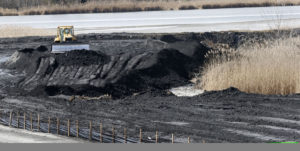
Under the gun to clean up its coal ash ponds, Dominion Energy hired a consulting firm to develop estimates of what various alternatives would cost. The alternatives preferred by environmentalists and activists — recycling the combustion residue and burying the rest in lined landfills far from rivers and streams — would cost billions of dollars, the study concluded. The environmentalists and activists said the study was flawed. The General Assembly ordered Dominion to issue an RFP to deliver a verdict from the marketplace. The verdict of the marketplace has come in. The alternatives preferred by environmentalists and activists will cost billions of dollars — but maybe not as many billions as Dominion’s worst-case scenario.
To be precise, the cost would range between $2.77 billion and $3.36 billion, according to a statement issued by the company today. The bids, if implemented would recycle about 45% of the ash into cement, wallboard and other products. The rest of the ash would be placed in a landfill over a 15-year period.
Dominion has accumulated millions of tons of coal ash, which can leak heavy metals that are toxic in sufficient concentrations, in ash ponds at its Chesterfield, Possum Point, Chesapeake, and Bremo power stations. To meet Environmental Protection Agency guidelines, the utility has de-watered the coal ash at Possum Point and Bremo but has been prevented from consolidating and capping the material on site, as it originally proposed. Environmentalists are concerned that groundwater might migrate through the impoundments and leach heavy metals that could reach rivers, streams, or well water.
Dominion already recycles 500,000 tons of coal combustion byproducts each year, but critics have argued that it could process more — Virginia actually imports coal ash from other states and overseas.
The company received 12 proposals for recycling ash for each of the four power stations. The total cost in the $3 billion range is somewhat less expensive than the $2.6 billion to $6.5 billion indicated by Dominion’s earlier study, but it is significantly more costly than critics had hoped for.
Dominion will report its bids to the General Assembly for follow-up.
In other coal ash action, Dominion announced that it had reached a Memorandum of Understanding with the state to close and monitor the coal ash ponds at the Chesapeake Energy Center. Also, groundwater monitoring at six power stations — Chesterfield, Possum Point, Bremo, Yorktown, Clover and Virginia City Hybrid Center — have been found to have no impact on drinking water or public health. Further, Dominion said it would submit a regulatory filing to recover costs associated with “managing coal ash at several power stations.”
“We plan to take a close look at this report and hope that it provides a more realistic take on recycling options in Virginia than the assessment Dominion provided last year,” said the Southern Environmental Law Center (SELC) in a statement today. “We know that coal ash can pose risks to our health and environment, and recycling offers a smart, cost-effective solution. It’s time Virginia joins the other states that are turning coal ash closure into a win-win.”
The SELC also lauded the Chesapeake Energy Center agreement, which it said will require the facility to meet the same standards as all coal ash facilities across the state. Said Deborah Murray, senior attorney, Southern Environmental Law Center: “This agreement is a strong signal that the administration is taking coal ash remediation in Virginia seriously. Dominion tried to keep most of the coal ash at the Chesapeake site—roughly 2.1 million tons of ash in leaking, unlined pits—off the radar, but under this agreement the company’s closure plan must deal with this ash in accordance with the standards set forth in the EPA’s Coal Combustion Residuals Rule.”
Update: The Richmond Times-Dispatch is reporting a larger number for the potential cost of recycling/landfilling than I did. I should have made clear that the cost I reported, up to $3.36 billion, applies if all the work is given to a single bidder. The higher figure reported by the Times-Dispatch, $5.642 billion, applies if material at all four sites is recycled by individual bidders. I reported the lower number because I could see no reason why anyone would go with the higher-cost approach.

Leave a Reply
You must be logged in to post a comment.